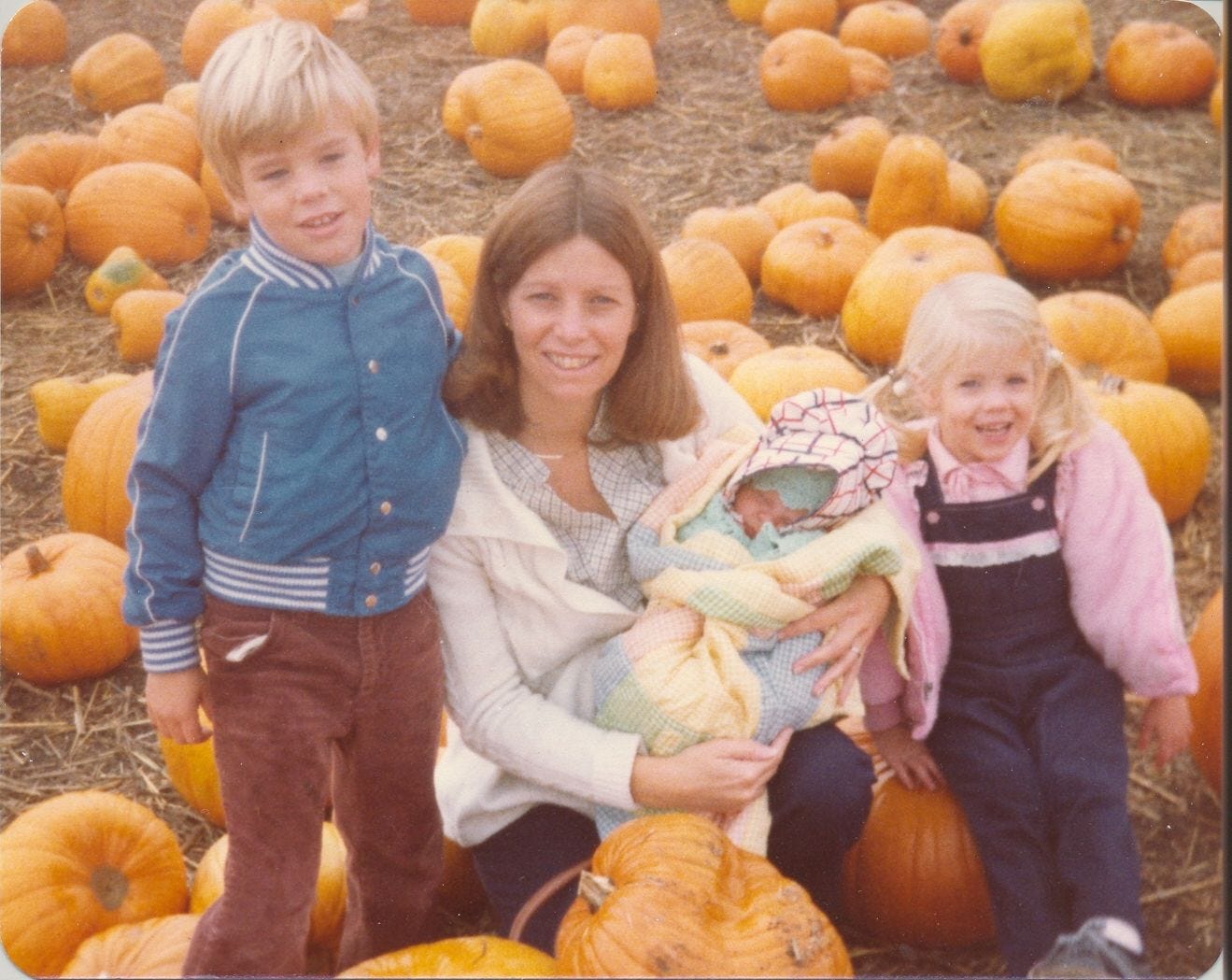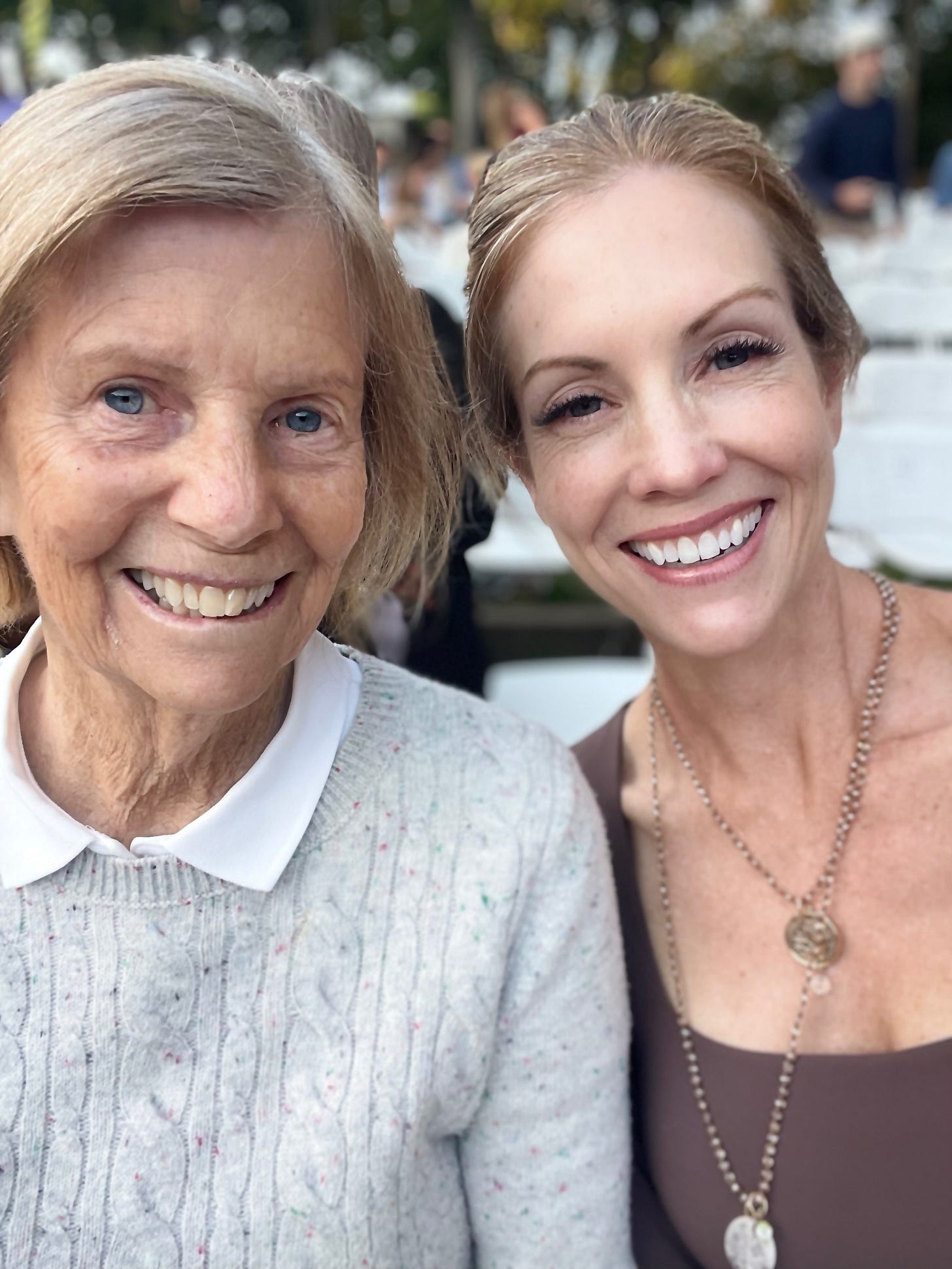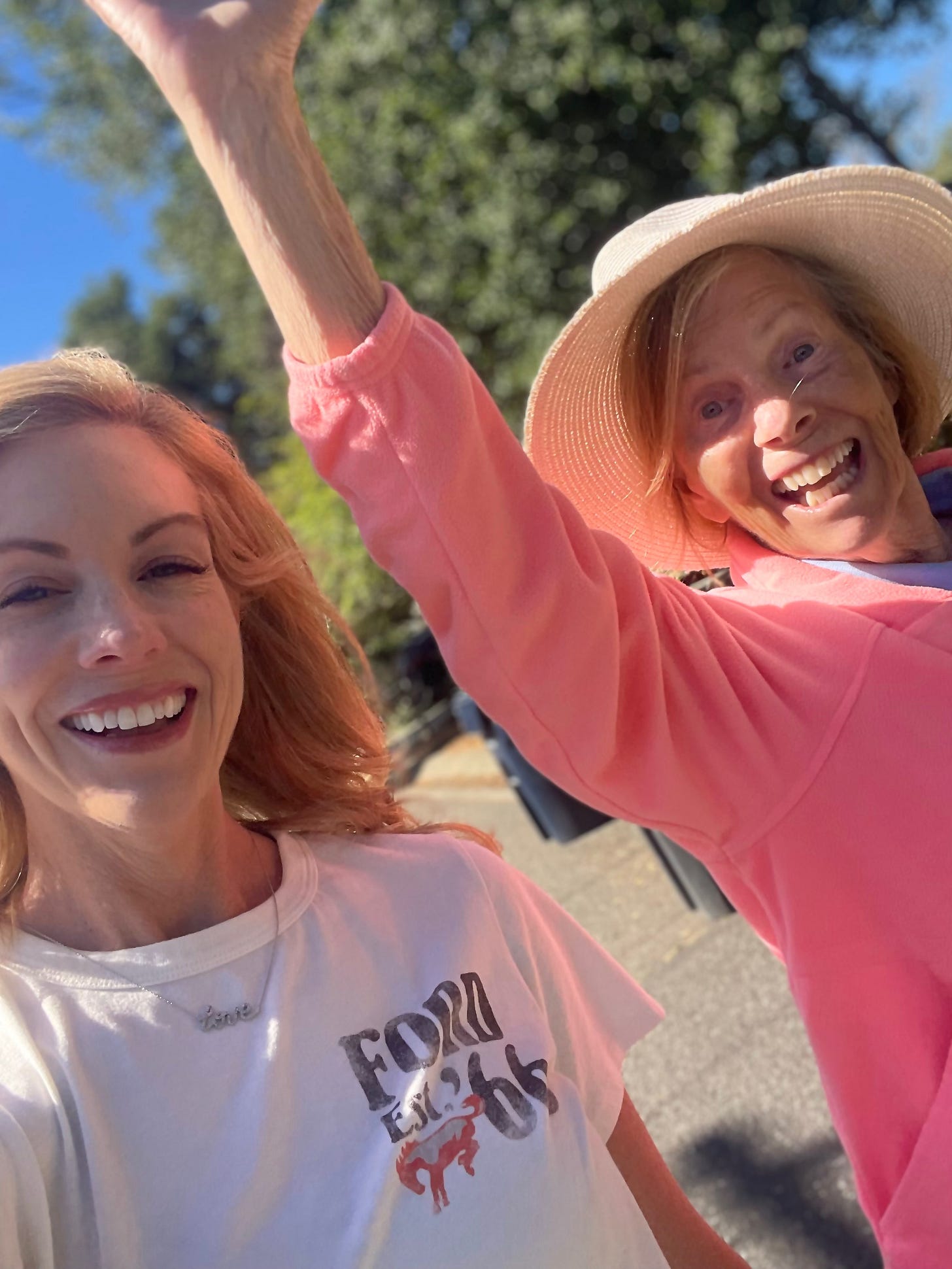I have a wise teacher these days.
The same one as before, only now she doesn’t have words.
The right ones, at least.
Those have disappeared into the darkness, along with seventy-seven years of memories.
Dementia is a merciless mugger, a thief of many precious things. But stealing my mother's superpower—her ability to connect with others through language—has been the biggest kick in the teeth.
That's not to say Mom was ever known for her advice or lectures—quite the opposite. Like all good teachers, my mother listened far more than she spoke and led primarily by example. She was the person who searched for and found the good in all those around her. The special education teacher who kept her classroom door propped open at lunch for any wandering soul in need of a seat, no questions asked. The appreciator of simple things like milkshakes and meatloaf, broken seashells and romance novels, starry skies and tattered bathrobes.
My mother was the mid-life woman with angry bunions who stood over a kitchen sink filled with Corelle dishes and Palmolive bubbles night after night, humming as though there was nowhere else she'd rather be. The gal who licked the batter off the mixing beaters and wore the swimsuit anyway. The unbridled soul who threw her head back when she laughed, especially at herself. The animal-lover who conversed with pets, birds, bugs, stray cats, and squirrels as though they were human.
For years, I watched my mother dole out second chances to nearly anyone who crossed her path, right down to the bees in our pool and the spiders on our walls.
“Go, baby, go,” she’d encourage these unsightly creatures, guarding them from my father's nets and swatters as she scooped them to safety.
I didn't think much of it back then—that was just Mom being Mom.
Only now do I see how these repeated, small acts of compassion became some of her most valuable lessons: the importance of seeing beyond one's stingers, claws, and tough outer shells; of searching for internal similarities over external differences; of choosing love and forgiveness whenever possible.
Mom never saw herself as a savior; she was merely a woman who savored each day and all that came with it.

Ironically, it was a squirrel that caught up to Mom's frontotemporal lobe one afternoon in a neurologist’s office. The doctor had held up a flashcard with a photo of a squirrel, and my mother couldn’t produce the right word for it—or at least convince the word to travel from her brain to her lips.
"Tail," she finally offered, shaking her head as soon as she’d said it, as though disgusted with herself. The word squirrel had already scurried off into the darkness, along with the correct word for most of the neurologist’s subsequent flashcards.
"What the hell?" said my mother quietly as he concluded his barrage of tests, her eyes downcast, her fists clenched, her shoulders drooped.
Back then, this was as close as Mom ever got to cursing. I wonder if she might have cried that day had the darkness not already swallowed her tears.
It had been two years since we’d first received Mom's formal diagnosis of Logopenic Primary Progressive Aphasia—a rare and incurable neurodegenerative disease that affects memory, speech, cognitive function, word retrieval, mood, empathy, personality, and basic life functions like bathing, dressing, reading, writing, and swallowing. We'd already had two years to grow accustomed to the cold medical jargon and shudder-inducing keywords like "progressive" and "non-curable.” We'd already learned that late-stage PPA would pathologically mimic Alzheimer's disease and that most individuals would grow apathetic, withdrawn, and silent as the brain continued to atrophy.
Yet, sitting in a doctor's office and receiving a diagnosis, no matter how grim, felt far different than sitting in a doctor's office a couple of years later and witnessing the unimaginable future symptoms become our present-day reality.
The neurologist instructed her to stop driving that day in a tone as aloof and abrupt as his demeanor.
"I'm going to report you to the DMV," he'd said, scooting his swivel stool back mid-appointment to do just that.
My mother was distraught for the remainder of the afternoon. Quite angry, in fact, for a woman who rarely lost her temper.
It was a terrible day.
The day she lost her car keys.
The day she lost trust in her own brain.
The day “them” became “us.”
And the day my husband and children found me sobbing in our hall bathroom, collapsed atop a closed toilet lid, my head in my hands, wailing to the deep tug of an invisible cord.
***
Several years ago, I saw one of my mother's brain scans.
I'm unsure where or how I viewed that MRI, but for the longest time, I wished I hadn't. It kept me up at night and haunted me during the day; I couldn't get the image of my mother’s head out of my own—all those empty black spaces where white brain matter was supposed to be.
I spent a long time loathing those black holes in my mother's brain, blaming them as they continued to erase her words and memories, her independence and personality, her past and her future. I watched them rob Mom of her ability to use a stove, sign her name, read a book, answer a phone, or take a walk by herself.
Every time a word like squirrel or shampoo or sister vanished into the darkness, it rang out like a warning shot, leaving me to wonder how long until my name would join the ever-growing list of casualties in our unwinnable war against dementia.
I spent a long time worrying about this unavoidable day.
Sometimes, I allowed hot grief and rage to pour down my cheeks in anticipation; I cried on mountain trails, breathless and unable to outrun the truth any further. Or pulled over on the side of the road if the wrong song had come on the car stereo.
Sometimes, my tears felt selfish. After all, my mother still lived only a short drive away, and hadn’t I been given the gift of time to make the most of our long goodbye?
But our unusual closeness was why each new fault line of separation was so painful.
For years, my mother had been my sounding board and cheerleader. My first phone call every morning and my last one every evening.
Mom had this uncanny ability to show up on my front porch during a particularly trying day with my three sons—the kind of afternoon that included wrestling matches and tears and someone refusing to get in the car for tutoring or Little League practice. I’d find myself at my wits’ end, longing to run or numb or scream, and then I’d hear Mom’s familiar six-beat knock on my front door and feel the enormity of her petite five-foot, two-inch frame stepping inside my home, like a relief pitcher stepping onto the mound.
"Boys, come on out! Nana is here to see you," I'd call out as my mother set down her purse and removed her coat.
And they would emerge, one boy after another, grinning and ready to play.
In those moments, I never dared tell my boys the truth: Nana was there for me most of all.
***
I quit drinking for good in the summer of 2020. I hadn't planned on getting sober—even the idea of cutting back felt impossible once my secretive, nightly wine habit had somehow morphed into a daily nightmare amidst the global pandemic.
But luckily for me, I awoke one terrible day to discover my own body hosting an intervention on itself: pancreatitis.
It was a shock to loved ones that I'd started drinking again, having already quit the shitshow once before in my late twenties—a lifetime ago before marriage, motherhood, and a mortgage.
But I had to learn the hard way that addiction does not discriminate, no matter how intelligent, successful, loved, disciplined, or polished the person.
I've seen the discharge papers from 2020; I know that I remained in that hospital for several days, detoxing and de-pancreatitising. Yet, all that remains in my memory are surreal, fragmented clips: me, heavily sedated and writhing in pain. There are tremors and tears and sweat-soaked, twisted-up hospital gowns. But there are also flashes of my mother standing over me, humming. I recall loving eyes and a masked mouth, her hands stroking my greasy hair.
Back then, I didn’t understand addiction.
The crushing internal shame I felt for being a wife and mother who drank so ugly—and for taking up a hospital bed while the COVID-19 virus raged on and the death toll continued to climb—nearly swallowed me whole.
Back then, I didn't understand that I, too, was fighting for my life.
It must not have been easy, but somehow, my gentle mother forced her way inside that locked-down hospital—the same woman who’d been battling non-Hodgkin’s lymphoma for nearly twenty years and had recently been diagnosed with LPPA.
Because of course she had.
This was, after all, the same woman who’d sat beside me week after week in recovery meetings back in 2007, trying to learn all she could about a substance she’d never developed a taste for or a dependence upon. The same woman who’d offered me a shoulder and not a “told you so” when the bad boy I thought was good for me shattered my heart. The same woman who’d brought home the ugliest pumpkin in the patch every October because she knew no one else would.
Somehow, this woman made it to my bedside during a global pandemic to love me through all the IVs and secrets and fear.
Because of course she had.

***
I wonder if somehow my mother subconsciously planned to lose her mind when she did—as if she’d held on long enough until she knew I’d be okay.
That sounds ridiculous to say out loud, but it also makes perfect sense if you know her. What I do know is that it was a gift to be standing on solid ground by the time my mother stopped remembering that I'm her daughter.
One evening last December, Mom had taken a bad fall in a dark parking lot. Late-night scans in the ER showed that she’d indeed broken her nose on the asphalt, but a trip to the dentist the following morning assured us that her teeth had been spared.
Mom was bruised and banged up, but we were lucky.
"Nancy, did you bring your daughter with you today?” the receptionist smiled at my mother as we prepared to leave the dental office.
Mom hesitated and shrugged, looking over at me and then back at the receptionist.
"I-I dunno. She is my good friend," my mother replied. "We have fun together!" At this, she made grand, sweeping gestures toward the ceiling and twirled her hands as though conducting a symphony.
I laughed—nervously and forced—because that felt preferable to bursting into tears inside the crowded waiting room.
But the receptionist met my eyes, and we shared a glance—that wordless, compassionate type that speaks volumes about grief, gratitude, and uncut cords.
As I placed my mother's arm in the crook of my own and headed for the exit, I felt oddly, unexpectedly held in the very moment I'd been dreading for so long. And I knew I’d be okay.
And two good friends made their way to the parking lot.
***
Yesterday, I gave my mother a bath.
As I do most days, I showed up on her doorstep, announcing my arrival with a familiar six-beat knock on her front door.
We finished the Hallmark movie she'd been watching and snuck a cookie when my dad left the room.
I told her we needed a bath, and she hid from me in her bedroom closet.
She asked me, “Why?” and told me “No” a dozen times, and I promised her it would be okay a dozen more.
A short time later, I knelt on my mid-life, aching knees beside a bathtub filled with Johnson’s Baby Wash, humming as though there was nowhere else I’d rather be.
I watched my mother’s folded hands tremble in the water as my own steady two took their time, sudsing and rinsing and hoisting her slippery, delicate body from the tub.
There was very little talking. There was no need. There is comfort in the silence between us these days.
I worked quickly to pat her dry with a towel as she stood on the bath mat, shivering ever so slightly.
“Burning,” she said.
"You're chilly, Mom?" I asked. "I'm so sorry."
I turned up the space heater and reached for her bra, undies, and shirt.
“You’ll be nice and warm in just a minute,” I assured her.
“Shit,” she said, shivering again and glaring at me beneath her pink polka-dot shower cap.
I threw my head back at this and laughed; I could not help it.
In return, she cracked a grin, unable to help it either.
This unfiltered side of my mother is new to all of us, and I must admit, it’s fucking adorable.
***
I've spent most of my life secretly fearing change, impermanence, and death. I've avoided looking too closely at aging bodies, fearful of folds of stretched skin, loose teeth, brittle bones, and blue veins too close to the surface and all they represent.
But lately, I've had the gift of facing some of my greatest fears in a cramped, steamy bathroom alongside my wise teacher. In her own quiet way, she has taught me the importance of embracing humanity, mortality, and my own physical vessel like never before.
What once seemed scary has turned sacred in my eyes. I will not look away again.
It helps that my mother won’t remember this; it helps that I never want to forget.
Dementia has a way of complicating everything and yet simplifying it, too. Her bathroom cabinets have become tidy and sparse—Cetaphil, Vaseline, and Aquaphor have replaced all creams, serums, and sprays; it helps that she never had much use for makeup.
On bath days, Mom still likes to select a shirt from her dresser drawer—always a collared shirt with a row of tiny buttons that she still likes to do herself. I watch, breathe, and wait as she works on those buttons. I don’t dare reach over or utter a word, remembering in my bones the many tedious mornings with my young children as they learned to put on their own shoes and I learned to not glance at the clock. I comb my mother’s baby-fine hair and tell her she’s so pretty because it’s precisely what I’m thinking. I apply lotion to her feet and ointment to her lips. Our final step is always her Fitbit—she still likes to wear one even though she no longer reads numbers, tells time, or tracks steps.
Yesterday, as I secured my mother’s smartwatch with its lilac band around her slim wrist with the age spots and paper-thin skin, it hit me:
Never again will my mother be late.
Never again will she worry about dates, deadlines, or schedules.
Never again will she live beyond the present moment, as each one arrives right on time for her.
Perhaps I've had it all wrong.
Perhaps the darkness is not an abyss but an invitation.
Perhaps she is the lucky one.
My mother cannot remember who has died, only how to live.
She carries no regrets of yesterday or fears of tomorrow.
She is the freest person I know.
She is free now to twirl her hands as though holding an invisible baton and spin around like a Deadhead in the middle of Walgreens when the right song comes on the speakers.
She is free now to wildly "parade wave" at babies and dogs as we meander down the street.
She is free now to take a stranger’s hands, look them in the eye, and declare, “It is always good to see you.” And mean it.
She is free now to simply be a passenger on this earthly journey, unworried about her destination.
***
After her bath yesterday, Mom and I strolled around the block.
She paid attention to every detail—the clouds in the sky, a Blue Jay on a wire, an airplane flying high overhead.
And I paid attention to every detail of her.
I have always felt lucky to be this woman’s daughter, but being her chosen "good friend" day after new day is perhaps an even greater honor.
We paused mid-step on our walk yesterday to marvel at a bushy-tailed creature racing around a tree trunk. Squirrel, I almost said—but then stopped myself. There was no need to name it. No need for words at all in this perfectly fine moment shared by two good friends.
I have a wise teacher these days.
The same one as before, only now she is blessed with wide open spaces.
And you can bet I’m taking notes.





Jenny that may be one of my favorite pieces of your beautiful writing. So raw and real. And with the ultimate reminder for us all. That all we have is the present moment.
Your ability to see this amid all of this heartache is remarkable. Thank you 🤍✨
Paying attention is such a spiritual act and you two good friends are practicing just that. Love you!